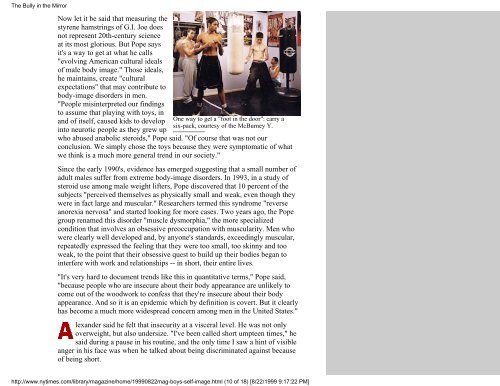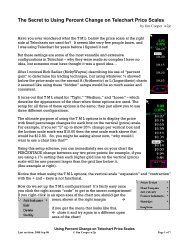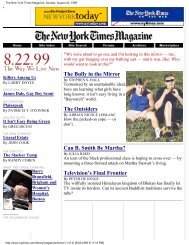The New York Times Magazine, Sunday, August 22 - Unauthorized ...
The New York Times Magazine, Sunday, August 22 - Unauthorized ...
The New York Times Magazine, Sunday, August 22 - Unauthorized ...
You also want an ePaper? Increase the reach of your titles
YUMPU automatically turns print PDFs into web optimized ePapers that Google loves.
<strong>The</strong> Bully in the Mirror<br />
Now let it be said that measuring the<br />
styrene hamstrings of G.I. Joe does<br />
not represent 20th-century science<br />
at its most glorious. But Pope says<br />
it's a way to get at what he calls<br />
"evolving American cultural ideals<br />
of male body image." Those ideals,<br />
he maintains, create "cultural<br />
expectations" that may contribute to<br />
body-image disorders in men.<br />
"People misinterpreted our findings<br />
to assume that playing with toys, in<br />
and of itself, caused kids to develop One way to get a "foot in the door": carry a<br />
six-pack, courtesy of the McBurney Y.<br />
into neurotic people as they grew up<br />
who abused anabolic steroids," Pope said. "Of course that was not our<br />
conclusion. We simply chose the toys because they were symptomatic of what<br />
we think is a much more general trend in our society."<br />
Since the early 1990's, evidence has emerged suggesting that a small number of<br />
adult males suffer from extreme body-image disorders. In 1993, in a study of<br />
steroid use among male weight lifters, Pope discovered that 10 percent of the<br />
subjects "perceived themselves as physically small and weak, even though they<br />
were in fact large and muscular." Researchers termed this syndrome "reverse<br />
anorexia nervosa" and started looking for more cases. Two years ago, the Pope<br />
group renamed this disorder "muscle dysmorphia," the more specialized<br />
condition that involves an obsessive preoccupation with muscularity. Men who<br />
were clearly well developed and, by anyone's standards, exceedingly muscular,<br />
repeatedly expressed the feeling that they were too small, too skinny and too<br />
weak, to the point that their obsessive quest to build up their bodies began to<br />
interfere with work and relationships -- in short, their entire lives.<br />
"It's very hard to document trends like this in quantitative terms," Pope said,<br />
"because people who are insecure about their body appearance are unlikely to<br />
come out of the woodwork to confess that they're insecure about their body<br />
appearance. And so it is an epidemic which by definition is covert. But it clearly<br />
has become a much more widespread concern among men in the United States."<br />
lexander said he felt that insecurity at a visceral level. He was not only<br />
overweight, but also undersize. "I've been called short umpteen times," he<br />
said during a pause in his routine, and the only time I saw a hint of visible<br />
anger in his face was when he talked about being discriminated against because<br />
of being short.<br />
http://www.nytimes.com/library/magazine/home/199908<strong>22</strong>mag-boys-self-image.html (10 of 18) [8/<strong>22</strong>/1999 9:17:<strong>22</strong> PM]






